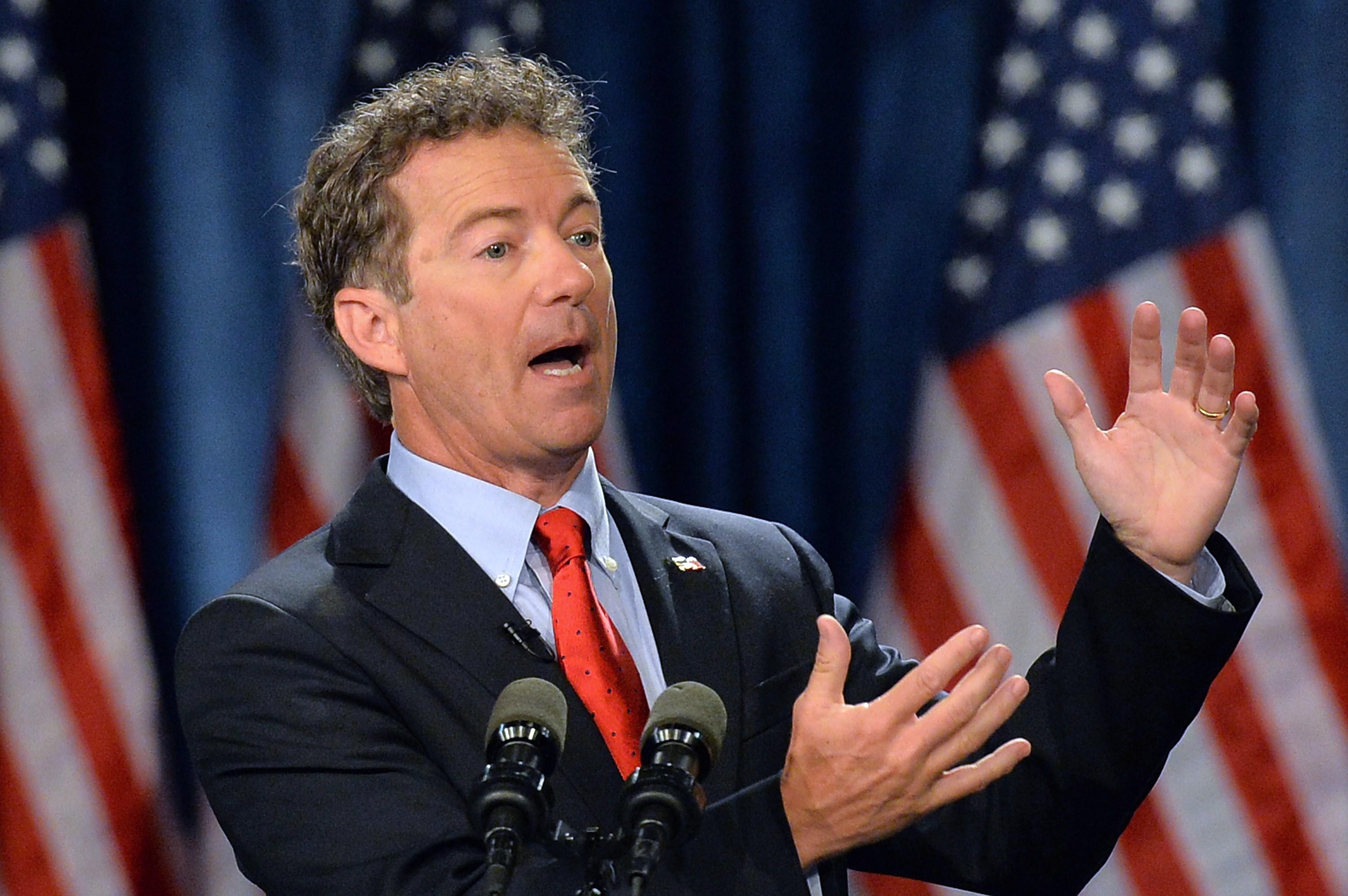For four years, Rand Paul has been running for president. And for those four years, he’s tried to be a different kind of Republican.
He went to Howard University to win over black Americans, to Silicon Valley to win the technology set, to Detroit to tout criminal-justice reform, and to other colleges across the country to win over young voters with a message of privacy and drug reform. At the same time, he’s made a pitch to evangelicals, tried to appeal to conservative business interests, and continued to cultivate his base of right-wing libertarians.
But, as everyone who runs for president eventually learns, the party doesn’t want a different kind of anything. The party wants someone acceptable—someone who seems electable and who has the support of other factions and interests in the coalition. Paul’s goal is to bring his brand of Republicanism to a broader group of Americans across the political spectrum, to show that there’s something for everyone. The Republican Party’s goal, by contrast, is to choose a nominee who best represents the party as a whole.
Paul seems to know this, and on Tuesday—announcing his bid for the Republican presidential nomination—he tried to balance his goals with what the party wants.
“This message of liberty is for all Americans, Americans from all walks of life. The message of liberty, opportunity, and justice is for all Americans, whether you wear a suit, a uniform, or overalls, whether you’re white or black, rich or poor,” he said in his speech, before turning to language favored by more traditional Republicans. “Self-esteem can’t be given; it must be earned. Work is not punishment; work is the reward.”
A few lines later, he seesawed back to his priorities, denouncing the so-called crony capitalism of Washington and the Obama administration—“Politically connected cronies get taxpayer dollars by the hundreds of millions and poor families across America continue to suffer”—and then sliding to a rhetorical place in which rank-and-file Republicans could feel comfortable. “I want to see millions of Americans back at work. In my vision for America, we’ll bring back manufacturing jobs that pay well. How? We’ll dramatically lower the tax on American companies that wish to bring their profits home.”
It’s not too hard to balance a message of radical small government—Paul wants a balanced-budget amendment to the Constitution—with traditional Republican concerns. More difficult is Paul’s long-standing opposition to Republican and Democratic foreign policy, which he sees as too militant and interventionist. “A more restrained foreign policy is the true conservative foreign policy,” he said in 2011, marking a position at odds with most Republicans and making him anathema to conservatives with strong, aggressive views on national security.
Paul seems to know he’s alienated the foreign-policy establishment, and for the past year, he’s tried to move closer to the pack, most prominently with a muddled call for action against ISIS. “ISIS is now a threat. Let’s get on with destroying them,” he said on the Senate floor in 2014. “But make no mistake—arming Islamic rebels in Syria will only make it harder to destroy ISIS.”
Since then, Paul has continued to refine his message by slowly abandoning his prior commitments, or at least subordinating them to more bellicose rhetoric. Hence the part of his announcement speech in which he declares that “the enemy” to the United States is “radical Islam” and promises to “do whatever it takes to defend America from these haters of mankind,” following up with a hawkish jab at Obama’s approach to diplomacy. “I believe in applying Reagan’s approach to foreign policy to the Iran issue. Successful negotiations with untrustworthy adversaries are only achieved from a position of strength. … I will oppose any deal that does not end Iran’s nuclear ambitions and have strong verification measures.”
The whole speech was an attempt to reconcile Paul’s goals and previous positions with the demands of a nomination contest, in which he’ll have to appeal to the full spectrum of Republican voters. It won’t work. Paul came off muddled, with a mishmash of positions that couldn’t congeal into a coherent vision; if this is how he’ll approach the primary, he may earn a little ground everywhere, but he won’t build a foundation (at least outside of his father’s supporters). After all, every other faction of conservatism has a champion. If you want a permissive business environment and wide deregulation, you can choose Scott Walker. If you want electability and potentially broader appeal, you can choose Jeb Bush. If you want evangelical fervor, there’s Ted Cruz, and if you want a hawkish foreign policy, there’s Marco Rubio.
Rand Paul’s “Have It Your Way” approach seems destined for failure even before we consider the positions—specifically, his history on foreign policy—that make him radioactive to important parts of the Republican primary electorate. There’s simply nothing that sets him apart from the crowd.
But Paul can change course. To do that, however, he has to understand that his campaign is an incredible long shot. In all likelihood, he won’t make it past the first round of primaries next winter. If that’s true, then his goal shouldn’t be to appeal to everyone but to make a specific pitch that can gain traction and move the party in his direction. He also needs to find a signature issue and hammer it hard. My (unsolicited) suggestion? Criminal-justice reform. At the state level, the Republican Party is moving away from its past punitiveness, but policy change hasn’t quite reached the national party. It’s the one place where a presidential candidate could move the conversation forward, building a larger constituency for reform and forcing the issue onto the party agenda.
No, that’s not the same as winning a nomination or becoming president, but it’s important. It matters. And Paul should give it a shot.
